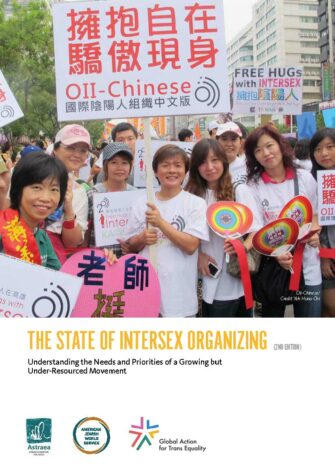Understanding the Needs and Priorities of a Growing but Under-Resourced Movement
About the publication
In 2016, the American Jewish World Service (AJWS), Astraea Lesbian Foundation for Justice (Astraea) and Global Action for Trans* Equality (GATE) surveyed 54 groups from across the globe working on intersex issues. The results provide a unique snapshot of the funding and organizational needs and experiences of those at the front line of addressing the significant human rights challenges facing intersex people. While funding for intersex work has improved modestly in recent years, the intersex movement remains deeply underfunded. Further, intersex groups face unique barriers to reaching donors and accessing funds.
Purpose of the Report
The State of Intersex Organizing intends to provoke dialogue among activists and donors, and serve as a call to action to donors to increase the amount and quality of resources flowing to the growing, dynamic, but under-resourced global intersex movement.
Intersex issues lie at the heart of human rights values, including bodily integrity, autonomy and self-determination. Many of the rights violations that intersex people face relate to the ways that their bodies do not conform to medical and societal expectations about sex and gender. As babies and children, intersex people face surgeries and other medically unnecessary, nonconsensual and irreversible medical interventions. As adults, intersex people experience stigma, discrimination and violence that impacts their well-being and access to education, health care, employment and public services. Although many people may not be familiar with intersex people and issues, activists and donors have been working for years to highlight the discrimination, stigma and human rights violations faced by intersex people.
Recommendations
- Fund work led by intersex people
- Provide flexible and stable funding to intersex groups
- Provide sufficient funding for paid staff
- Invest in anti-trauma and burnout prevention
- Invest in the organizational strengthening of intersex groups
- Support intersex activists to build community and national-level work, while they continue to advance work at the international level
- Educate your funding institution and your peers about intersex issues
- Decrease the barriers preventing intersex groups from finding and applying for funding, particularly by explicitly targeting calls for proposals to intersex groups and funding unregistered groups using intermediaries.
Authors:
This report was written by Erin Howe and Somjen Frazer from Strength in Numbers Consulting Group and Gitta Zomorodi.
Written input and review provided by Ruth Baldacchino, Mauro Cabral, Morgan Carpenter, Namita Chad, Masen Davis, Sarah Gunther and David Scamell. Review of translation provided by Karen Bennett, Hiker Chiu, Anna Kirey, Caroline Kouassiaman and Tingting Shen. Survey design and data analysis by Somjen Frazer and Melissa Dumont of Strength in Numbers Consulting Group. Editing by Bosede Cajuste. Design by Hope Mickiewicz. Leah Kaplan Robbins, Elizabeth Leih and Liesl Theron provided support during the production of the report. The Global Philanthropy Project, the International Trans Fund, and Astraea’s Intersex Human Rights Fund partnered in the dissemination of this report.
We are grateful to the 54 intersex groups who took time out from their important work to respond to this survey and share detailed information about their work with us. In particular, we would like to thank the organizations who provided information for the case studies featured in the report. We hope this report will serve and advance the struggle for intersex human rights, as well as be a tool to mobilize additional needed resources.
We also thank the donors who provided project support for the production and dissemination of this report: American Jewish World Service and Open Society Foundations.
Reference:
When referencing this report, we recommend the following citation:
Howe, E., Frazer, S., Dumont, M. and Zomorodi, G. (2017). The State of Intersex Organizing (2nd Edition): Understanding the Needs and Priorities of a Growing but Under-Resourced Movement. New York: American Jewish World Service, Astraea Lesbian Foundation for Justice and Global Action for Trans Equality.
Copyleft:
You are free to share (copy, distribute and transmit the work) and to remix – that is to adapt – this work, as long as you attribute the work in the manner specified by the authors (but not in any way that suggests that they endorse you or your use of the work) and do not use this work for commercial purposes. If you alter, transform, or build upon this work, you may distribute the resulting work only under the same or similar license to this one.






